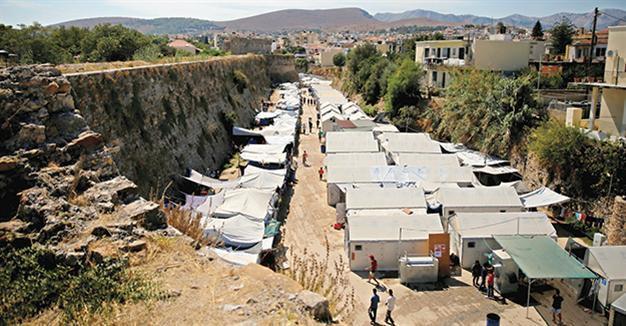EU to double emergency aid for refugees stuck in Greece
ATHENS/BRUSSELS - Reuters

REUTERS photo
The European Union will more than double emergency aid to Greece in order to improve living conditions for refugees and migrants who have been stranded in the country for months.
Some 115 million euros ($129 million) in emergency support is being provided by the EU, in addition to 83 million euros earlier this year, the European Commission said on Sept. 10.
The money would be channeled via humanitarian organizations towards improving living shelters and access for refugee children to education, while part would be given in cash or voucher schemes, it added.
“The new funding has the key aim of improving conditions for refugees in Greece and make a difference ahead of the upcoming winter,” Humanitarian Aid Commissioner Christos Stylianides said.
Just under 60,000 refugees and migrants are stuck in Greece after their attempts to head to central and northern Europe were prevented by a cascade of border shutdowns throughout the Balkans at the start of the year.
Many are accommodated in abandoned army camps or factories. The EU’s emergency support aid is in addition to financial support given under other funding programs.
Meanwhile, the EU also announced on Sept. 8 it was contracting 348 million euros ($393 million) to the U.N. World Food Program (WFP) for humanitarian aid to Syrian refugees in Turkey, part of the bloc’s migration cooperation with Ankara.
The money comes as part of a 3-billion-euro support for some 3 million Syrian refugees living in Turkey, which the EU promised in return for Ankara’s help in curbing the number of people embarking from there for Europe.
“This is the largest humanitarian program the EU has ever financed,” the bloc’s Stylianides said in announcing the deal.
“The EU is keeping its promise of assisting Turkey in hosting the largest refugee population in the world.”
The WFP, together with the Turkish Red Crescent, will roll out a system under which refugees would get pre-paid cards to cover for food, housing, schooling or medical expenses in Turkey, where most Syrian refugees live outside camps.
Stylianides stressed allowing refugees to choose what they buy was important in giving the distressed people a sense of dignity and could help their relations with local communities.
